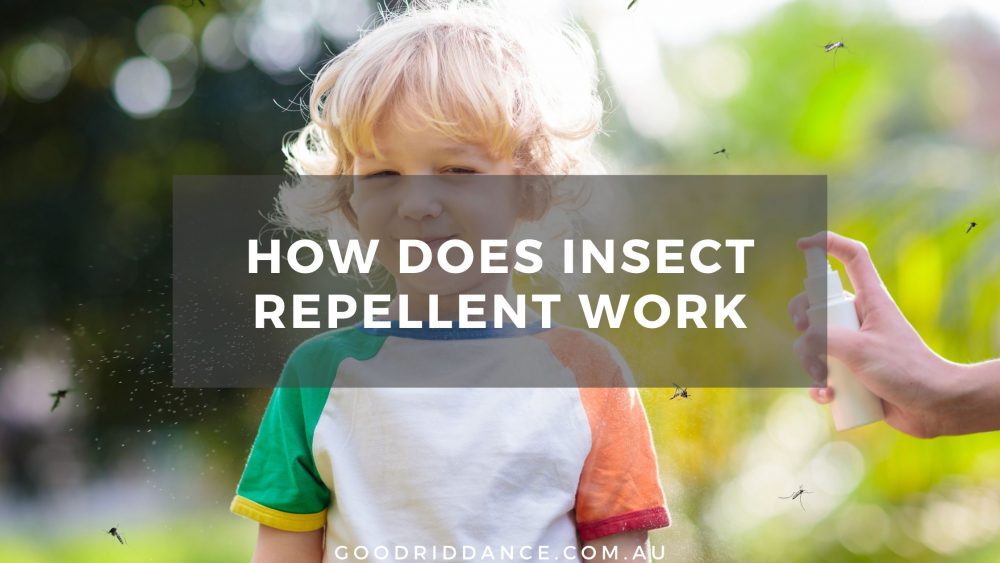How does insect repellent work?

Today we’re looking at another of our most frequently asked questions – how does insect repellent work?
Mosquitoes find you, their delicious meal, in a few different ways. They first identify people from a distance by the carbon dioxide we exhale with each breath. When they get a little closer, they can feel our body heat and smell our odour. Then they land and confirm that we’re food by tasting us with their legs – then biting for a tasty snack.
So, in order to discourage mosquitoes, we can target any of these areas. Some tactics are better than others – we can’t do anything about the carbon dioxide around us or our body heat without dire consequences, so odour is the way to go!
Research has found that there are certain scents that mosquitoes (and sandflies and midges) dislike and will actively avoid. These include:

But, the process to find an effective blend of essential oils was not a straight-forward one. Founder of Good Riddance Jeannie has a Diploma in Personal Care Formulation and developed our products through extensive research and testing. It was really important to Jeannie that our product smell amazing and provide long lasting protection, so we did things a little differently. Good Riddance insect repellents are unusual in that they use a cream base. You’re probably used to spraying on your bug spray, but there’s an important reason we went with the cream.
Essential oils can have a pesky tendency to evaporate – often quickly, particularly if they’re sprayed on. By using a cream base that is rich in shea butter and beeswax, our formulation holds the essential oils on your skin, which means you don’t need to reapply as often. It also provides a physical barrier against some of those bugs, making it harder for them to land on you and bite. And our independent clinical testing backs this up, showing just how well our insect repellents work compared to DEET spray.
During the development testing of our repellents, we wanted to make sure it could handle the toughest environments Australia has to offer. So, we asked fishermen in notoriously mosquito-heavy areas of the Northern Territory to test it out for us – and they told us we passed with flying colours.
Since then, we’ve put our products through significant independent clinical trials and become registered with APVMA, Australia’s accreditation body for insect repellents – for the final proof our insect repellent does the job and does it well.
We hope you now know some more about how insect repellent works.


Mosquitoes find you, their delicious meal, in a few different ways. They first identify people from a distance by the carbon dioxide we exhale with each breath. When they get a little closer, they can feel our body heat and smell our odour. Then they land and confirm that we’re food by tasting us with their legs – then biting for a tasty snack.
So, in order to discourage mosquitoes, we can target any of these areas. Some tactics are better than others – we can’t do anything about the carbon dioxide around us or our body heat without dire consequences, so odour is the way to go!
Research has found that there are certain scents that mosquitoes (and sandflies and midges) dislike and will actively avoid. These include:
- Cymbopogon spp and;
- Lemon tea tree.

But, the process to find an effective blend of essential oils was not a straight-forward one. Founder of Good Riddance Jeannie has a Diploma in Personal Care Formulation and developed our products through extensive research and testing. It was really important to Jeannie that our product smell amazing and provide long lasting protection, so we did things a little differently. Good Riddance insect repellents are unusual in that they use a cream base. You’re probably used to spraying on your bug spray, but there’s an important reason we went with the cream.
Essential oils can have a pesky tendency to evaporate – often quickly, particularly if they’re sprayed on. By using a cream base that is rich in shea butter and beeswax, our formulation holds the essential oils on your skin, which means you don’t need to reapply as often. It also provides a physical barrier against some of those bugs, making it harder for them to land on you and bite. And our independent clinical testing backs this up, showing just how well our insect repellents work compared to DEET spray.
During the development testing of our repellents, we wanted to make sure it could handle the toughest environments Australia has to offer. So, we asked fishermen in notoriously mosquito-heavy areas of the Northern Territory to test it out for us – and they told us we passed with flying colours.
Since then, we’ve put our products through significant independent clinical trials and become registered with APVMA, Australia’s accreditation body for insect repellents – for the final proof our insect repellent does the job and does it well.
We hope you now know some more about how insect repellent works.




